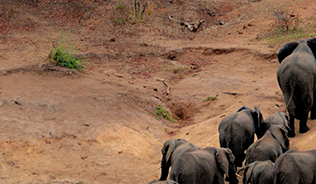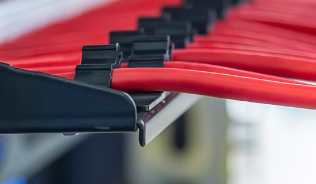Our annual membership survey not only collects quantitative responses, but also gives members a chance to provide written feedback on our membership services.
Once we've summarised the numerical results (see our Membership Survey report), the Project Office discusses the written comments in detail. As a member-driven organisation, our membership survey is a vital tool for addressing members' concerns, queries and suggestions.
The most common comment submitted was that the IES was not hosting enough events outside of London. Over the last year, we have looked to bring a number of our events, meetings and workshops to cities across the UK, including: our Annual General Meeting in Manchester, Routes to Clean Air in Birmingham, A Plastic Ocean Screening and Panel debate in Bristol and Edinburgh, as well as two CEnv in a Day workshops in Manchester and more scheduled for Leeds this year. We will continue to bring more events to our members outside of London over the course of the coming year.
We also received a number of comments about whether members can view our webinars on-demand, every webinar is recorded and posted onto the analysis section of our website and on our Youtube Channel. Many members also requested that we broadcast more frequent webinars. This year we have already increased the number of webinars broadcast, but we need your help to keep the frequency high. If you are interested in recommending a speaker or presenting a webinar yourself, please get in touch with our Events Officer. All our upcoming webinars are released on the Events page of the IES website.
There were a number of specific comments from survey respondents. As the survey is anonymous we can't answer you directly, so I have summarised below:
-
A less academic feel the to Journal. - Over the course of the year the IES produces 4 or 5 editions of the Environmental SCIENTIST, some are specific to a field and others seek to take a more broad overview of a topic including opinion pieces, interviews, and case studies. We always welcome suggestions and contributions of articles for the journal and input into our publications, if you are interested in contributing, please get in touch with our Publications Officer.
-
Webinar sound quality is sometimes poor, I know you are working to improve this. - We have now upgraded our in office microphone and are pleased to say we now have much higher quality audio when webinars are hosted in the IES office. Unfortunately we have no control over the audio quality of webinars that are hosted out of the office but do our best to advise presenters to use high quality microphones if possible.
-
It would be nice to be asked if you want to mentor and how to get involved even in a small way. - For a number of years we have run a mentoring scheme for those looking for work and last year we launched a new chartership mentoring scheme. We are always looking for new mentors, please get in contact with Chloe Fletcher for more details.
-
I have received two copies [of the journal] out of three is in wet condition. - We have heard from a couple of members overseas that journals have arrived damaged and wet, we passed this information on to our printers and distributors. They have informed us that they have changed overseas suppliers.
-
When one is unemployed one is unlikely to be able to meet the requirement for CPD hours in each of the required categories. - If you are currently unemployed, the IES offers a reduced rate for membership and waives CPD requirement for the period of unemployment.
-
What is the difference between the journal and the newsletter. - We produce four editions of the journal every year on a range of topics in the environmental sciences, they offer deep insight into ongoing research as well as providing a platform for opinion to be shared within the community. The newsletter is a monthly overview of what is happening within the IES office and membership. It includes upcoming events, current job vacancies, information about our latest publication and environmental science news.
-
Your webinars are always very professionally run and on time (especially in comparison to other professional institutes!) The journal is also great, its quarterly so not too often and not too infrequent. It would be good if this could be sent via email or be provided online instead of being printed to save paper and reduce other resource use. - We greatly appreciate the commendation of both our webinars and the journal, if you are interested, we do offer web-only journal access. To do so, log into the Members Area and click on the Preference Centre, here you can choose to opt out of the paper journal if you wish.
-
Retired Member should have a reduction on the Chartered registration. - There is no current automatic reduced rate for retired members chartership registration online, however, if you would like to call the office directly we will be able to offer you a reduced rate. We continue to lobby the Science Council and the Society for the Environment to reduce their fees for retired members.
-
Have vignettes about members of how membership of IES is useful to their jobs. - You can find profiles of IES members on the Join Us section of the website by following the links to each membership grade. A membership profile appears in every newsletter.
In the survey we asked members to suggest topics for our journals, reports, guidance documents, webinars or analysis pieces. Thank you to those who did; we will be considering these when planning our future publications. Some of the suggestions have already been addressed previously in a number of formats and we have outlined these below for easy access.
-
Contaminated land - This year we published our sector-specific Challenging perceptions in land condition journal.
-
Plastic waste - On world environment day this year we hosted three screenings of the documentary "A Plastic Ocean" followed by an expert panel debate. We will be following this up later in the year with a journal focused on Marine Science.
-
Food production and consumption - In February of 2017, we published the journal Feeding the nine-billion specifically focused on exploring the challenges brought about by the rising global population.
Many thanks to all who filled in the survey. Your responses are much appreciated and directly contribute towards making the IES a better organisation. If you have any further comments, you can contact the IES office at any time of the year.
We will continue to engage with the issues raised this year through our events, publications, analysis and policy work.





